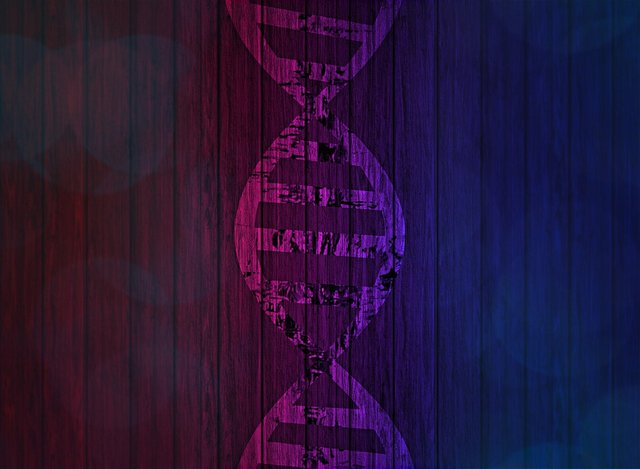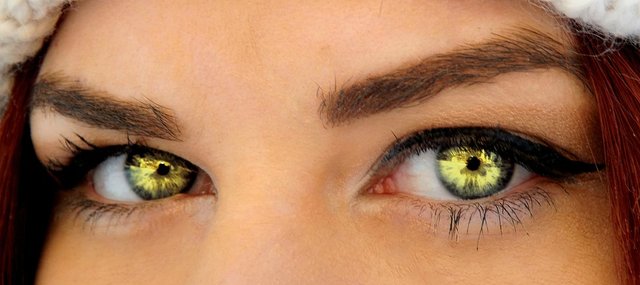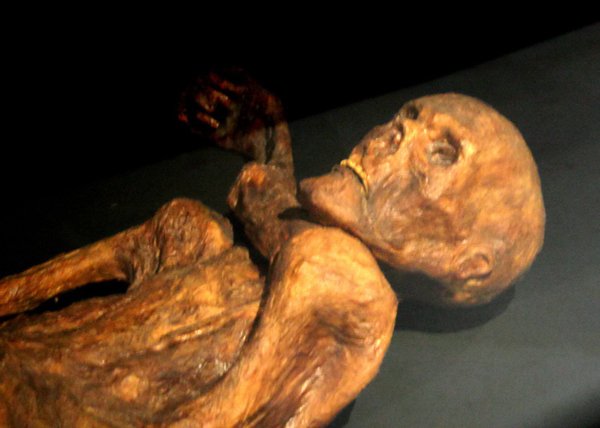The reciprocal influence between you and your genes
Among other things, also our genes define who we are. Traits like physical strength, genius and beauty are often ascribed to our genes. In some cases, our genotype can really help understanding our traits. Let's just think about the size of Shaquille O'Neil, the famous basketball player, or the endurance of Eero Mantyranta, the famous polycythemic Finnish skier that because of his condition has higher than average red blood cells count.
Sometimes all we need is a glance and we can already assess the genetic condition of an individual (nonetheless, if you meet a beautiful girl on the street I would not recommend complimenting her about her genome, you may not get the desired effects).
The eyes of a person, for instance, are known to be a window to his soul and let me tell you, also to his genome. In some cases, for example, the spacing between the eyes can be indicative of a genetic disease such as the Fanconi anemia. In this case, the individual will have the eyes closer together (Lambert 1987). Or an easier one would be the shape of the eyes in the case of the Down's syndrome. However, the spacing or the shape of someone's eyes are not always a good metric to assess the genetic conditions of an individual, in light of the fact that these traits are determined by more than 400 different genetic combinations.
Indeed, physical appearance can deceive us sometimes. There is the clamorous example of a Danish sperm donor. He seemingly had all desirable traits, he was blond, tall and healthy. He became the biological father of 40 children. Unfortunately, he passed along his passive gene for neurofibromatosis and many of his children became sick, developed tumors or suffered epilepsy, learning difficulties or blindness.
Another, even more clamorous case of genotype deception is the XX male syndrome or De la Chapelle syndrome. Luckily this is a rare disease but during meiosis in the father there could be an uneven crossing over between the X and Y chromosome resulting with the SRY gene on the X chromosome. What does it mean? The individual will look like a male but will have XX genotype (de la Chapelle 1972; Vorona et al. 2007).
It should be clear by now that there are many rules and exceptions to the rules but sometimes we can also take the opposite path and try gather information regarding an individual from his genotype. Welcome to the realm of archeology! For example, in 1991, in the Italian Alps was found a 5,000 years old mummy named Otzi. By analizing a bone fragment from its hip we were able to determine that it had light skin, brown eyes, he had type 0 blood, he was lactose intollerant and if he did not bleed to death would probably have died of cardiovascular disease as he had a genetic predispositon for it.
Our genes can also affect how we metabolize food. The sailors figured this out centuries ago. In fact, when sailors were on a boat for too long they started having vitamin C deficiency that often led to scurvy. This was a disease conducive to bleeding gums and bruising. To avoid this, sailors learned that they had to eat plenty of lime or fruits, but they noticed that for some individuals much fewer limes were needed to stay healthy. These individuals had a variation in the SLC23A1 gene that enable them to metabolize more effectively vitamin C.
If you are not a seafarer I will give you a closer example on how genes can affect you in your daily life. Some individuals have 1 copy of the gene encoding for the enzyme CYP1A2, while others have 2 copies. If you happen to have 1 copy you will metabolize coffee really slowly and a single cup of espresso would be enough to make you feel energized. If you happen to have 2 copies of the gene CYP1A2 probably even a liter of coffee will still leave you yawning (Note: I am not telling you to drink 1 liter of coffee). Another fun fact is that nicotine can activate CYP1A2, thus if you like to smoke a cigarette with your coffee you should know that you are killing the effect of coffee (Zevin and Benowitz 1999).
It looks complex right? Well you will happy to learn that there is more. Our relation to our genes is not a one-way thing. We and especially our environment can also influence the expression of our genes. It's called epigenetics. Plants use it more than us to adapt to hostile environments, but scientists found that even in human, environment-directed changes in gene expression can be maintained for generations. Here there is an example: scientists have tried to repeatedly separate newly born mice from their mothers, this caused an emotional stress that provoked a change in the DNA methylation pattern resulting in behavior change of the little mice. In fact, when they grew up they were much more likely to give up rather than fight in difficult situations. The genes involved in this change were Mecp2 and Crfr2 (also found in humans) and the striking fact was that these changes were maintained also by the other generations (Franklin et al. 2010).
It is true that our genes help define who we are, but it is also true that the way we live our life and our choices can change the expression of our genes, in some cases the changes may even be transmitted to your offspring, so it may be worth it living a healthy life.
References:
- Franklin, Tamara B. et al. 2010. “Epigenetic Transmission of the Impact of Early Stress Across Generations.” Biological Psychiatry 68(5): 408–15. http://linkinghub.elsevier.com/retrieve/pii/S0006322310005767.
- de la Chapelle, A. 1972. “Analytic Review: Nature and Origin of Males with XX Sex Chromosomes.” American journal of human genetics 24(1): 71–105. http://www.ncbi.nlm.nih.gov/pubmed/4622299.
- Lambert, W C. 1987. “Genetic Diseases Associated with DNA and Chromosomal Instability.” Dermatologic clinics 5(1): 85–108. http://www.ncbi.nlm.nih.gov/pubmed/3549081.
- Vorona, Elena et al. 2007. “Clinical, Endocrinological, and Epigenetic Features of the 46,XX Male Syndrome, Compared with 47,XXY Klinefelter Patients.” The Journal of Clinical Endocrinology & Metabolism 92(9): 3458–65. https://academic.oup.com/jcem/article-lookup/doi/10.1210/jc.2007-0447.
- Zevin, S, and N L Benowitz. 1999. “Drug Interactions with Tobacco Smoking. An Update.” Clinical pharmacokinetics 36(6): 425–38. http://www.ncbi.nlm.nih.gov/pubmed/10427467.
Communities that are supporting me are:
Immagine CC0 Creative Commons, si ringrazia @mrazura per il logo **ITASTEM**. **CLICK HERE AND VOTE FOR DAVINCI.WITNESS**
Logo created by @vogliofatti
To join @steemstem you can go to this discord server.








If I am right this is the explanation of
Phenotype= Genotype + Environmental factors.
Nice post, but one thing still unclear to me is how this environmental factors and our way of leaving affect our genes, like is it a reversible action (i mean since our genes play a major part in how we live, how we behave and eat).
How then does a deliberate change in our way of living affect our genes?
Now this question of mine might sound confusing or let me say indicating that I did not read the post which I actually did, even the topic is closely related.
But my question is how does this process happen ( the reversible one- us affecting our genes)
Interesting, really. We usually think this is my nature, like there is no way to change our deepest part, our genes. Well, that's not true, we actually change a lot over time, even thanks to small or big events affecting our life, like being separated from a person we love (if this is true for a mouse, why shouldn't be as well for human beings?).
Sometimes you expect evolution to be something so big and far from your daily life, while it is there, right in front of you, in you.
And, last but not least, you gave me the best explanation ever for the high inefficacy of coffee on me! I have 2 copies of that bloody gene!
Thank you for sharing this, it helps a lot to understand ourselves, our nature and the possibilities of changing even our genes hidden behind every interaction with our environment.
Thank you for your comment, I am glad you liked the topic. Since you have 2 copies of the gene I hope you don't smoke as well otherwise you may be completely "immune" to coffee ;)
Fortunately, I don't smoke ;)
On the other hand, I drink a lot of coffee everyday :P
Thank you!
cool, so if I'm in Malta I'll call you if I want a coffee ;)
Definitely <3
Your section about the X/Y chromosomes made me think about this recent post of @alexander.alexis. I am sure you will like it, if you haven't read it already.
This being said, I cannot prevent myself to comment about the coffee part. To be honest, I can totally go to sleep after a cup of coffee or more. I don't know the amount of CYP1A2's in my DNA (and I am too lazy to check), but I may have some insight about what is going on now. I would say: cool ^^
ahahah, thanks for the suggestion I will check that out. I have the same "issue" with coffee, to me it has more of a placebo effect, I'm just so used to it now.
You forget one important point: it tastes good :D
you are right, if I did not think of that it means I spent too much time in the US :)
Ahaha! Yeah, there may be some correlations :D
Tanti spunti interessanti per capire chi siamo e cosa diverremo, purtroppo la frenesia e lo stress potrebbe incidere negativamente...comunque credo di essere completamente immune al caffè. un saluto @giornalista
quindi se ti offro un caffe' non potrai dirmi di no ;)
I am interested in knowing about that Danish donor?
And I agree with what you say about our environment affecting our genes, I think our thoughts can change us internally one way or another, and since our thoughts are affected by our environment, then it is the same as saying our environment affects our genes.
thank you for your comment, what would you like to know about the Danish donor?
Just his name so I can research more about the story
sure, here we go: https://www.telegraph.co.uk/news/health/news/9565451/Danish-sperm-donor-passes-severe-genetic-disorder-to-five-children.html
Thanks!
Sorry to say this but you may want to check out the copyright section of your third photo. It is also located here
In essence it states:
Thank you for pointing that out, when I formatted the post I must have switched links with the other image, the one that is on now is taken from https://commons.wikimedia.org
No worries :D Glad everything is good now!
Hello friend, excellent post,
Thanks for sharing and hopefully you will be more successful for your work.
You can check my article https://stееmit.com/@juvyjabian/fall-in-the-philippines-2018-03-19-06-50-43 and give me your feedback!
I will follow you.